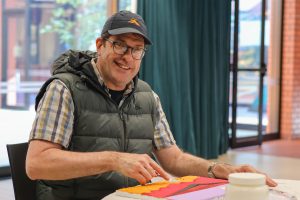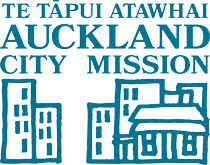Tuesday 16 September 2025
“Homelessness can happen to anybody. If I can become homeless, anyone can.”

Before dawn on ANZAC Day 2023, Scott was cycling into central Wellington when he collided head-on with another cyclist. The impact left him with injuries to his wrist, shoulder and head – and set off a downward spiral he could never have imagined.
In the weeks that followed, Scott developed symptoms of concussion: “I started having difficulty with my memory and my ability to absorb and process information.”
At the time, Scott was contracting for a central government department, but the symptoms began to affect his work: “I went from being the best performing person in my team to the worst. Even writing reports or remembering the last phone call became really difficult. So they ended my contract early.”
Scott faced a 12 week wait in Wellington for specialist treatment for his head injury. With no job or close family keeping him in Wellington, Scott made the decision to move up to Auckland: “to expedite treatment for my concussion.”
He started treatment soon after arriving in Auckland, but the symptoms persisted.
In the meantime, Scott struggled to find somewhere affordable to live, staying first in hostels then renting a room in a private house. “I burnt through my savings quickly. The landlord put up the rent from $280 to $300 then $350 in the space of three months! I couldn’t keep up with the rent because I wasn’t able to work.”
With nowhere to go, Scott walked around the city, searching for a safe place to sleep.
He found shelter under a wheelchair ramp in central Auckland.
“It was maybe five metres long, two and a half metres wide. Unless the wind blew really strong from the north and it rained at the same time, it was dry.”
“There was quite a bit of undergrowth surrounding the area, so I had a privacy screen and somewhere to stash my bags. I learned that if people can’t see you when you’re sleeping rough, they won’t get ideas about harming you or stealing stuff.”
This small patch of dirt was Scott’s home through the winter.
“Every couple of nights I’d go and get some new cardboard, put that down with a blanket and a sleeping bag on top.”
“Luckily it wasn’t so cold last winter, but it was certainly wet. At one point, we had rain for five or six days straight. I couldn’t get my boots dry. The glue between the bottom and the upper part of the shoe split and they fell apart.”
“It was really hard. I never in my wildest imagination thought that I’d end up sleeping rough.”
The hardest part was not knowing when – or how – it would end.
“Sleeping rough made me worry a lot about the future. I didn’t have a pathway into housing – I didn’t even know how to get on the social housing register. I just had to do the best I could every day to keep myself buoyant. But I was lucky because I was only a 15-minute walk to the City Mission.”
Scott started coming to the Mission every morning for a hot meal in Haeata, our community dining room.
“I was completely reliant on the Mission for meals, because for a few weeks I wasn’t receiving any [government support].”
Through Haeata, he was also connected to the wrap-around social support he urgently needed, including medical care at our Calder Health Centre and housing support from our Street to Home team. With the help of a Street to Home key worker, Scott was finally able to move into an apartment of his own.
“It was incredible! I didn’t believe it was real for the first week! It took a while to get out of the hypervigilance of living rough for six months into a calmer state and regular sleeping patterns. It even took me a few days to get used to sleeping on a proper mattress. It was a big change – having my own space again, being able to make a cup of tea or have a shower when I want to.”
Just as importantly, Scott has found a welcoming community at the Mission.
“Being on the street can be a very disconnected existence. You don’t have a lot of social interactions. So the connections that I have made through the Mission have been really important. I’ve built a network of good friends through the community activities run at HomeGround.”
He started coming to the weekly art classes at the Mission while he was still sleeping rough.
“At the time I was on the street and very anxious. So being able to engage in an activity which kept my brain focused in the here-and-now, not ruminating about the past or worrying about the future, was a really big thing for me. The classes gave me a creative outlet and something to look forward to.”
Earlier this year, six of Scott’s paintings were sold at an art exhibition at the Mission: “It’s been a really rewarding journey”
He is also part of Mana Tāne, a weekly support group for men who use the Mission’s services:
“It’s a safe, open space where men can come together and talk about blokey stuff in a non-judgmental space. It’s good to step outside of ourselves and hear somebody else’s story, and it has allowed us to form good, trusting friendships.”
Today Scott is hopeful about the future. “I’ve got to keep working on my short-term memory and cognitive abilities, but I’ve learned a lot about myself and become more resilient. I survived. Now I’d like to find some volunteer work, and then to transition back into a job. Something where I can help other people [on the street].”
And Scott has a message of thanks for everyone who has supported his journey: “I want to encourage all of the donors of the Mission to keep doing what you’re doing because you’re having an amazing impact for so many people. Your support is bearing fruit – I see on a daily basis all the positive transitions that people are going through and it’s only possible because of you.”
